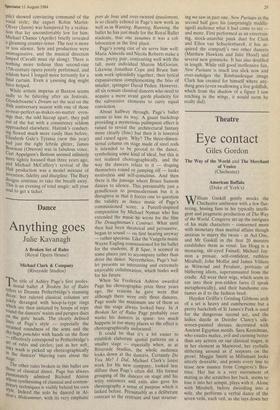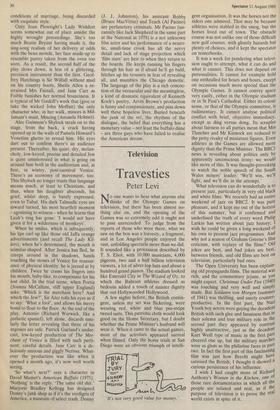Theatre
Eye contact
Giles Gordon
The Way of the World and The Merchant of Venice (Chichester) American Buffalo (Duke of York's)
William Gaskill gently mocks the Chichester ambience with a few flut- tering, hissing fans in his typically intelli- gent and pragmatic production of The Way of the World. Congreve set up the intrigues of his male characters – concerned more with monetary than marital affairs though anxious to marry the twain – in Act One, and Mr Gaskill in the first 20 minutes establishes them as venal. Ian Hogg is a menacing, slit-eyed Fainall; Michael Jay- ston a prosaic, self-confident, ruthless Mirabell; John Moffat and James Villiers as Witwoud and Petulant, portraits of blithering idiots, superannuated from the cradle. All wear their wigs, which seem to eat into their pox-ridden faces (I speak metaphorically), and their handsome cos- tumes as if to the fashion bred.
Hayden Griffin's Grinling Gibbons arch of a set is heavy and cumbersome but a pretty backcloth of St James's Park is used for the dangerous second act, and the ladies dazzle in Deirdre Clancy's silk- screen-painted dresses decorated with Ancient Egyptian motifs. Sara Kestelman, who exudes malice, evil and cunning better than any actress on our classical stages, is in her element as Marwood, her eyeballs slithering around as if serpents on the prowl. Maggie Smith as Millamant looks utterly desirable, and points every line to tease new nuance from Congreve's Bea- trice. Her fan is a very instrument of mating as she scratches her back, seems to lose it into her armpit, plays with it. Alone with Mirabell, before dwindling into a wife, she performs a verbal dance of the seven veils, each veil, as she lays down her conditions of marriage, being discarded with exquisite style.
Only Joan Plowright's Lady Wishfort seems somewhat out of place amidst the highly wrought proceedings. She's too much Beatie Bryant having made it, the sing-song realism of her delivery at odds with the beau monde, her face made-up to resemble pastry taken from the oven too soon. As a result, the second half of the play slows down, is less of a glittering, precision instrument than the first. Geof- frey Hutchings is Sir Wilfull without mud on his country boots, Sheila Allen a re- strained Mrs Fainall, and Jane Carr as Foible banishes her normal bounciness. It is typical of Mr Gaskill's work that (give or take the wicked John Moffatt) the only character who, in her walk, minces is Mil- lamant's maid, Mincing (Amanda Holmes).
Alec Guinness's Shylock steals on to the stage, from the back, a crack having opened up in the walls of Pamela Howard's Venetian ghetto to reveal him. His eyes dart out to confirm there's an audience present. Thereafter, his quiet, dry, melan- choly, low-keyed, precise and detailed Jew is quite uninterested in what is going on around him both in the auditorium and, at first, in wintry, post-carnival Venice. There's an economy of movement, too. This Shylock no longer trusts that language means much, at least to Christians, and thus, when his daughter absconds, his grief, whilst deep, is barely expressed, even to Tubal. His dark Talmudic eyes are inward turned, his most heartfelt moment — agonising to witness — when he learns that Leah's ring has gone: 'I would not have given it for a wilderness of monkeys'.
When he smiles, which is infrequently, his lips curl up like those old Jaffa orange advertisments (and recall The Lady Kil- lers); when he's determined, the mouth is scimitar-shaped. After Jessica has fled, he creeps around in the shadows, hands touching the stones of Venice for reassur- ance of physical identity: he is jeered at by children. Twice he crams his fingers into his mouth, baby-like, to compensate for his lost child, In the trial scene, when Portia (Joanna McCallum, stiff upper England) asks: 'Which is the merchant here? And which the Jew?', Sir Alec rolls his eyes as if to say: 'What a fool', and allows his merry bond to float to the floor. At the end of the play, Antonio (Richard Warwick, like a pathetic spaniel), left alone, discards simi- larly the letter revealing that three of his argosies are safe. Patrick Garland's under- cast, low-keyed production of The Mer- chant of Venice is filled with such perti- nent, careful details. Jane Carr is a de- liciously anxious and giggly Nerissa. What- ever the production was like when it opened a month ago, it's now well worth seeing.
'So what's next?' says a character in David Mamet's American Buffalo (1975). 'Nothing' is the reply. 'The same old shit.' Marjorie Bradley Kellogg has designed Donny's junk shop as if it's the verdigris of America, a museum of select trash. Donny (J. J. Johnston), his assistant Bobby (Bruce MacVittie) and Teach (Al Pacino) are perfunctory criminals. Mr Pacino (un- cannily like Jack Shepherd in the same part at the National in 1978) is a not unknown film actor and his performance of a neuro- tic, small-time crook has all the nervy detail and lack of stage projection which 'film stars' are heir to when they return to the boards. He keeps running his fingers through his hair as if afraid he'll go bald, hitches up his trousers in fear of revealing all, and mumbles the Chicago demotic. The language of the play is a rich concoc- tion of the vernacular and the meaningless, a kind of dramatic equivalent of Kenneth Koch's poetry. Arvin Brown's production is funny and compassionate, and pins down well these hopeless lives. Buried beneath the junk of the set, the rhythms of the dialogue, the belief that everything has a monetary value — not least the buffalo dime — are three guys who have failed to realise the American dream.







































 Previous page
Previous page